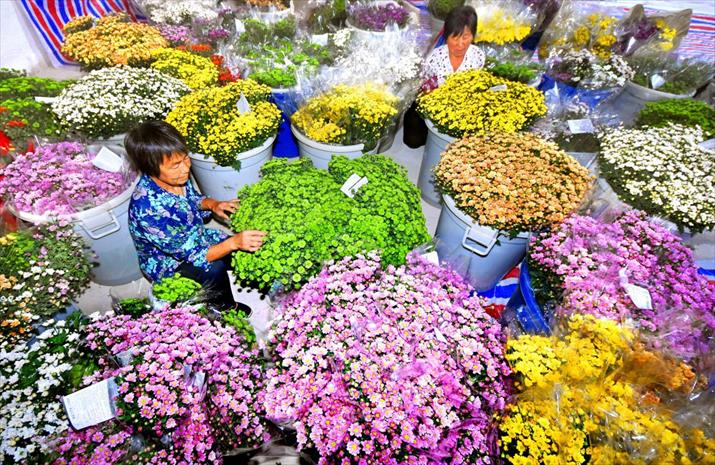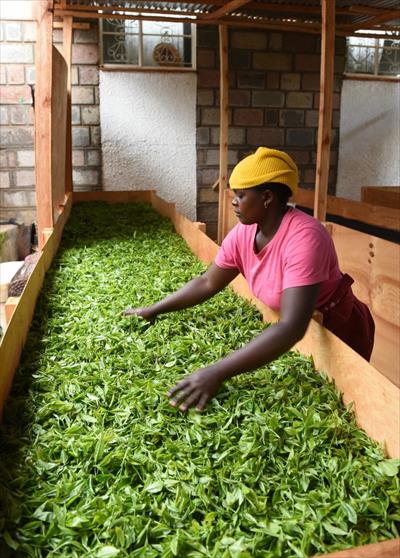|
||||||||||
| Home Nation World Business Opinion Lifestyle ChinAfrica Multimedia Columnists Documents Special Reports |
|
||||||||||
| Home Nation World Business Opinion Lifestyle ChinAfrica Multimedia Columnists Documents Special Reports |
| Business |
| Flowering Exports |
| Kenya's horticultural exports see a growing shift toward China |
| By Gitonga Njeru | VOL.9 September 2017 ·2017-08-28 |

China has a big market for cut flowers
Joscan Makau and his wife Elias have been horticultural farmers in Kenya for years and recently seen a shift in their market options.
The couple, who farm in Kutumani, Machakos County in east Kenya, are also proprietors of Macau Fruits Ltd., and turning their eyes east when it comes to exports.
"Apart from exporting to Europe, I also put focus also on exporting to China, which is presenting us with opportunities," said Makau. "On our 35-acre (14 hectares) farm, we grow mangos, kale, bananas, baby carrots, and amaranth (a traditional African vegetable)." He can make a profit of $100,000 per year from his farm.
His customers are mostly private restaurants and three supermarket chains in China, while in Western Europe, he supplies the giant Carrefour supermarket chain with produce.
According to the Kenya National Chamber of Commerce and Industry (KNCCI), the shift in horticultural exports from Europe to China is now becoming more evident.
Kiprono Kittony, Chairman of KNNCI, a chamber under the country's Ministry of Industry, Trade and Cooperatives, said figures show that exports could rely entirely on the Chinese market in future.
"The trade restrictions governing the EU are immense. Despite good opportunities of good money for exporters there, legal trade restrictions prevail and continue to discourage exporters," said Kittony.
Cut flowers which are used in weddings and funerals are the leading horticultural exports to China. The flowers grown in Kenya include roses, orchids, carnations and gladioli and are mainly in the central and eastern parts of the country and parts of Rift Valley provinces.
Other horticultural exports to China include a wide range of fruits and vegetables.
Chinese market
"The EU has a quota system that limits the amount of agriculture produce you can export," said Kittony, adding that this was less of a case in China.
An added advantage is that Kenya Airways and China Southern Airlines, both of which have direct flights between Kenya and China, facilitate transportation of perishable horticultural products.
He confirmed that the value of horticultural exports to China between January and July this year totaled $320 million. This figure is 16 times more than the horticultural exports to China in 2015.
"A market study to learn about consumer behavior was done in China early last year. It was found that the Chinese are large consumers of flowers for many cultural events," said Kittony, adding that the study also revealed that Chinese consume large amounts of fruits and vegetables. "However, the Kenyan Government is in bilateral talks with the Chinese Government to waive a 4-percent import tariff," said Kittony, who is also the vice chairman of the World Chambers Federation.
Opportunities for farmers
Kenya is one of the world's leading producers and exporters of horticulture. The total value of horticulture exports last year was $1.8 billion, according to the Kenya National Bureau of Statistics. The country is the leading exporter of cut rose flowers to the EU with a market share of 38 percent in 2016.
"Traditionally, 90 percent of exports were destined to the EU, [however] restrictive trade barriers in the EU continue to discourage exporters," said Professor Germano Mwabu, a World Bank economist and an economics professor at the prestigious University of Nairobi.
The change in markets from Europe to China is a surprise to many, Mwabu asserts. "The quick shift is evidently [due to] China's foreign policy toward African countries. European foreign policies mainly benefit and protect their citizens. That is why Africa is embracing China as a brother," said Mwabu.

Kenya also exports tea to China
Adding to this shift is the access to financing for farmers. Mwabu said the amount of loans to Kenyan farmers facilitating their entry into the horticulture export business by banks has doubled since 2014 and farmers are cashing in.
"More people have realized there are markets for horticulture. [But first] you have to prove that [markets exist] to any lender before they will give you their money. Collateral is never enough. The amount of loans given so far has reached $900 million," said Mwabu.
He said that the World Bank will also launch a program next year that will give grants to farmers ranging between $5,000 and $300,000.
According to the Kenya National Bureau of Statistics, the move to supply the Chinese market has created more than 18,000 direct jobs since January 2016. Also, 69 new micro export companies have been established as banks continue to give loans to horticulture entrepreneurs.
"Later this year or early next year, exporters plan to organize a symposium in Beijing to discuss challenges and current opportunities and a way forward," said farmer Joscan Makau. "There is no quota system in China as in the EU. So opportunities exist," he said.
Future prospects
Kittony hoped that more horticulture export companies will be set up as China continues to open its market to Africa. "Visa restrictions [to China] are not as stringent compared to those of European countries," said Kittony. He also questioned whether or not in future Chinese farmers would farm in Kenya and export their produce back home.
"Land policies under current Kenyan laws are already in place and foreigners can own land. I hope more and more Chinese are settling here and work with Kenyan citizens," said Kittony, hinting that anything was possible.
More than 50 percent of Kenyan agricultural exports comprises horticulture, Kittony added. Other Kenyan exports to China include tea, coffee, beef, crocodile meat, and textiles.
Kenya also hopes to export exotic meat products to China such as impala and ostrich by next year. More than 10 other African countries are also exporting horticulture, including South Africa, Nigeria, Tunisia and Namibia.
(Reporting from Kenya)
|
||||||||
| About Us | Contact Us | Advertise with Us | Subscribe |
| Copyright Beijing Review All rights reserved 京ICP备08005356号-5 京公网安备110102005860号 |